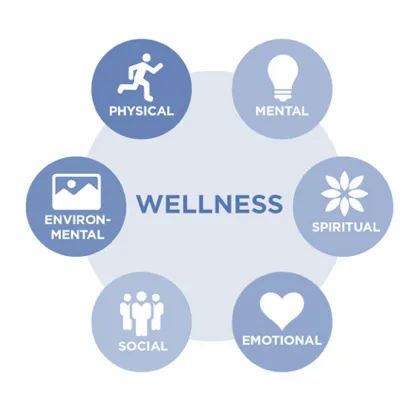Wellness: The Enduring Pursuit of Holistic Health
Wellness—that collective sum of intentional choices, pursuits, and behaviors—is intrinsic to achieving optimal, holistic health. Synonymous with fitness, healthy eating, mindfulness, and self-care, wellness ultimately lays the groundwork for our well-being.
 Today, wellness is ubiquitous. Headlines, handles, and health columns feature it with fervor—often mistakenly interchanging “wellness” with “health.” Although wellness and health are intimately related and share common elements, they are not interchangeable. In short (and to paraphrase the World Health Organization), health is a physical or mental state of being, while wellness is an active, dynamic process of change and growth that leads to the attainment of health. Wellness represents an evolution—from the reactive to the proactive—in our self-care engagement and approach to healthy living.
Today, wellness is ubiquitous. Headlines, handles, and health columns feature it with fervor—often mistakenly interchanging “wellness” with “health.” Although wellness and health are intimately related and share common elements, they are not interchangeable. In short (and to paraphrase the World Health Organization), health is a physical or mental state of being, while wellness is an active, dynamic process of change and growth that leads to the attainment of health. Wellness represents an evolution—from the reactive to the proactive—in our self-care engagement and approach to healthy living.
The Ancient Roots of Wellness

The origins of wellness can be traced to ancient civilizations—from India and China to Greece and Rome. Ayurveda—a natural system of medicine informed, in part, by the idea of universal interconnectedness—originated in India more than 3,000 years ago. Similarly, ancient Chinese medicine was influenced by the idea of cultivating bodily harmony and balance; ancient Chinese medicine incorporated holistic approaches to healing with many ancient practices (e.g., acupuncture, tai chi) informing modern wellness. In Greece, the ancient Greek physician Hippocrates deviated from conventional thought and contended that health correlated to diet, life choices, and
environmental factors. Romans adopted the Greek belief that diet and lifestyle impacted health—manifesting illness prevention in Rome’s highly developed public health system.
From these ancient civilizations, the concept of wellness as both preventive and holistic emerged.
In the 19th century, movements championing preventive, holistic, and natural modalities swept across Europe and the United States—propelled later by the writings and thought leadership of Halbert L. Dunn and his 1961 book High-Level Wellness. Credited with coining the term “wellness,” Dunn penned ideas on wellness that did not initially receive notable attention, but that later inspired a group of American physicians and thinkers, nicknamed the “fathers of the wellness movement,” to create models of wellness, develop wellness assessment tools, and create the world’s first wellness centers.
The Multiple Dimensions of Wellness
 Once upon a time, wellness was broadly conceptualized as the absence of negative elements such as disease or illness. Today, we better understand wellness to encompass much more than physical health; instead, it comprises multiple, mutually interdependent dimensions—including but not limited to the physical, mental, spiritual, emotional, social, and environmental. Each symbiotic dimension is instrumental to our overall health—from good nutrition and proper sleep to effectively expressing emotions and building supportive relationships and beyond. When nourished, these wellness dimensions harmonize—enabling us to achieve a vibrant, fulfilling life.
Once upon a time, wellness was broadly conceptualized as the absence of negative elements such as disease or illness. Today, we better understand wellness to encompass much more than physical health; instead, it comprises multiple, mutually interdependent dimensions—including but not limited to the physical, mental, spiritual, emotional, social, and environmental. Each symbiotic dimension is instrumental to our overall health—from good nutrition and proper sleep to effectively expressing emotions and building supportive relationships and beyond. When nourished, these wellness dimensions harmonize—enabling us to achieve a vibrant, fulfilling life.
The holistic approach inherent to wellness is a hallmark of Anodyne Pain & Wellness Solutions’ comprehensive care model. Housed under one roof, Anodyne provider teams—including nurses, chiropractic physicians, physical therapists, behavioral therapists, and providers board-certified in pain management, anesthesiology, neurology, sleep medicine, and headache medicine—work together to address the physical, emotional, and spiritual dimensions of patient needs. Anodyne healthcare providers have expertise in a number of wellness domains including but not limited to medical weight loss, behavioral health, massage therapy, hormone replacement, and sexual wellness.
To learn more about Anodyne’s innovative wellness treatments—including the wellness program of the month initiative—visit https://anodynepain.com/ today.
Related Articles
Whether you’re struggling to diagnose a chronic pain condition or you’re pursuing wellness treatments to stay healthy and feel great, we’re here to support you at every step of your health care journey.


